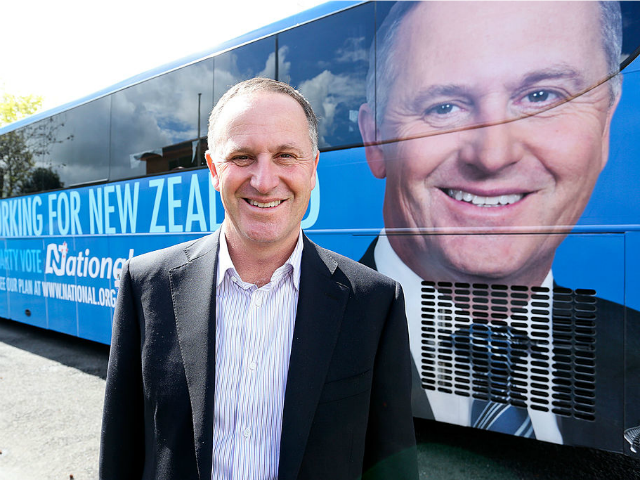New Zealand’s Prime Minister John Key (pictured) has defended bringing in record numbers of migrants, arguing that unemployed Kiwis have a poor work ethic and that some “won’t pass a drugs test”.
Speaking on Morning Report Today, the prime minister said the government would continue to admit huge numbers of migrants despite admitting New Zealand’s infrastructure is being strained by the influx.
Key’s comments come after it emerged a record 69,000 people settled in the country of just 4.471 million people in the year to July. New Zealand’s Labour party has criticised the government for bringing in thousands of workers from overseas while 200,000 Kiwis are unemployed.
The Prime Minister said his government had tried to get New Zealanders doing jobs like fruit picking, but argued businesses find many locals unemployable.
He told Radio New Zealand: “Go and ask the employers, and they will say some of these people won’t pass a drug test, some of these people won’t turn up for work, some of these people will claim they have health issues later on”.
Asked why, with so many Kiwis unemployed, the country needed to import “hairdressers, truck drivers and bakers” Key said besides locals lacking these skills, there are often geographic factors, for example a particular town may lack a hairdresser.
The New Zealand National Party leader also defended the policy of importing café managers citing a place nearby that he frequents which has a South African manager who “does an amazing job of running it”.
Key admitted that large numbers of migrants put pressure on the country’s infrastructure, telling his interviewer it means: “you need to spend more money on the basic services, whether it’s education or policing or whatever it might be, a bigger population drives that.”
The prime minister said the flipside to pressure on services is that migrants “add quite a lot of value” to New Zealand in the form of their culture, and economic growth.
Former Green MP Sue Bradford branded Key’s remarks a “shameful attack”, in an opinion piece for Radio New Zealand.
The left wing activist noted that of the 69,000 migrants who arrived in the last year relatively few will have settled in rural areas, suggesting “Most will have taken up jobs in the cities and this is where the real damage is being done.”
Bradford wrote: “John Key’s comments – and his government’s laissez-faire immigration policies – set worker against worker while enhancing the ability of business to make larger and larger profits.
“The currently high level of unskilled migration panders to employers who want to keep wages low and precarious workers hungry for extra hours.”
Writing of Key’s acknowledgement that migrants put pressure on public services, the former MP observed that it’s the low-paid “who endure the impacts of high housing costs, the under-resourcing of health, education and welfare”, while “the owners of capital are laughing all the way to the bank”.
Labour leader Andrew Little, who earlier this year pledged his party would cap immigration, accused the Prime Minister of writing jobless Kiwis off.
Little said: “I don’t buy the argument that there are young people who can’t work because they are drugged and lazy. Our social conscience dictates that we make it a priority to get young people into work. For those who have a few rough edges on them, we need to go the extra mile and make the extra effort to enable them to get into work.
“There are a whole heap of young people who some employers and clearly the government – Bill English and John Key now – write off as either ‘pretty damn hopeless’ or drugged and lazy, as an excuse for them not to make the extra effort to get them into work.”
Last month the Labour leader called for a review of the country’s skills shortage list, saying that work permits are being issued for jobs that thousands of New Zealanders are trying to get.
Leading real estate company Harcourts has also sounded alarm at the level of migration to the country, noting it has caused average house prices to rise by 15 per cent since July 2015 while available stock has decreased by nearly 24 per cent in the same period.

COMMENTS
Please let us know if you're having issues with commenting.